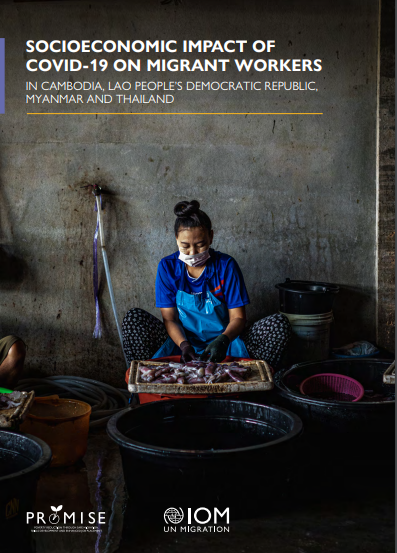IOM Report Examines the Socioeconomic Impact of COVID-19 on Migrant Workers in GMS Countries

Migrant workers are essential to economic and social development across the Greater Mekong Subregion. They compensate for a growing shortage of labor and contribute substantially towards the economic well-being of many households through remittances.
Although they were among the hardest hit by the coronavirus disease 2019 (COVID-19) pandemic, migrant workers—whose vulnerabilities were made more apparent by the health crisis—continue to contribute to the economy across the region as essential workers amid COVID-19. If included within policies and plans for socioeconomic recovery from the pandemic, migrant workers can act as key drivers for building back better. However, the availability of comprehensive data that can be used to inform the development of a migrant-centered approach to socioeconomic recovery remains scarce.
This research Socioeconomic Impact of COVID-19 on Migrant Workers in Cambodia, Lao People’s Democratic Republic, Myanmar and Thailand conducted by the International Organization for Migration under the Poverty Reduction through Safe Migration, Skills Development and Enhanced Job Placement (PROMISE) Program assesses the socioeconomic impact of COVID-19 on migrant workers in Cambodia, Lao People’s Democratic Republic, Myanmar, and Thailand, and their families. The findings from this study will provide evidence and recommendations to the governments of these four countries as well as social partners to assist in shaping policies and plans for economic and social resilience and recovery.
The study concludes with evidence-based recommendations formulated from a mixed-method research methodology including a quantitative survey with a total of 2,187 migrants, 156 employers, and 63 key informant interviews. It focuses on topics, including the following:
- Decision-making about remaining in Thailand or returning to countries of origin;
- Impact of COVID-19 on stayees, migrant workers who were working in Thailand before the onset of COVID-19 and stayed in Thailand at least until the time of the survey, and returnees, migrant workers who were working in Thailand before the onset of COVID-19 and returned to Cambodia and Lao People’s Democratic Republic after March 2020;
- COVID-19 prevention measures;
- Debt and remittances;
- Remigration and re-employment; and
- Skills development and retraining.
Download the publication from the IOM website.
Last Updated: Thursday, 24 February 2022
